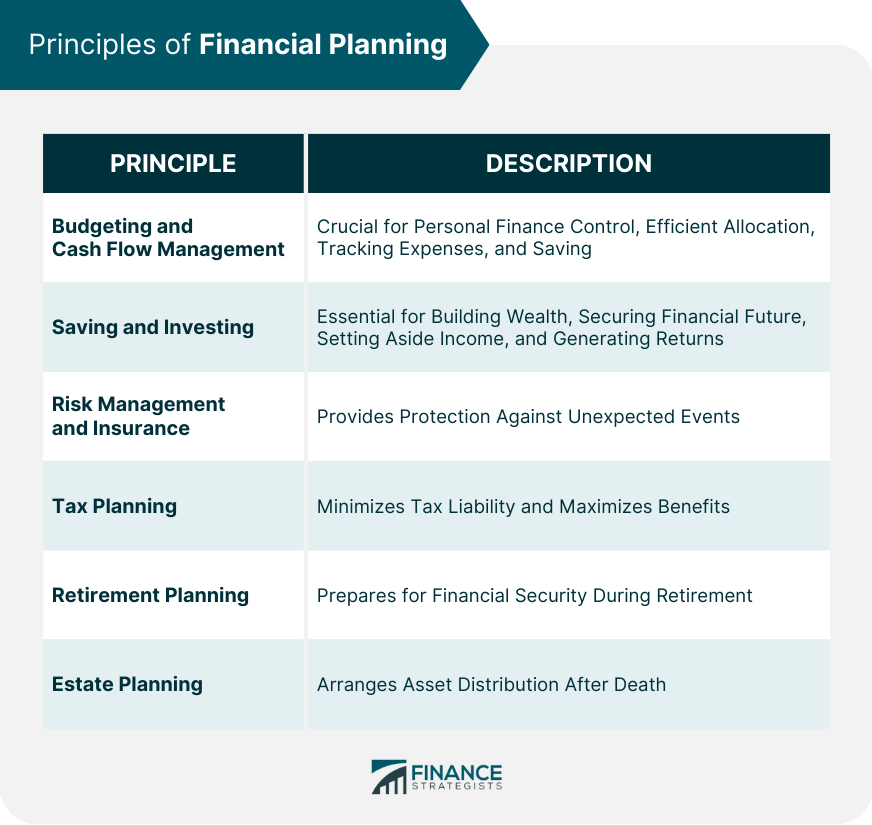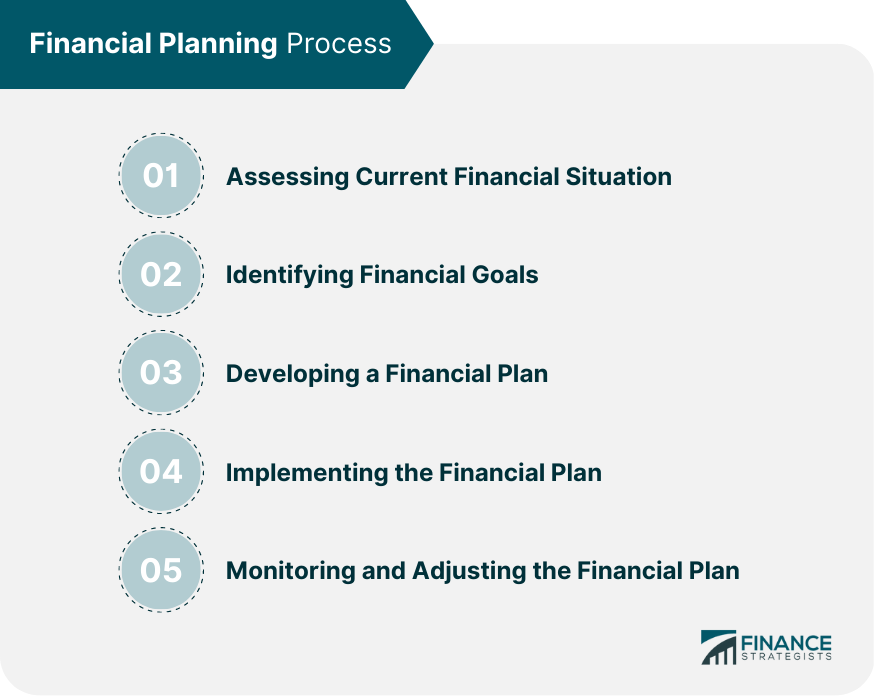Financial planning is essential for achieving financial stability and success. Financial planning involves the strategic management of financial resources to achieve specific financial goals. It encompasses saving, investing, budgeting, and risk management, among other aspects. A well-executed financial plan helps individuals attain financial security and build wealth over time. Proper financial planning allows individuals to make informed decisions about their financial future. It helps in managing income, building assets, and ensuring financial stability. Financial planning also mitigates risks and prepares individuals for unforeseen events and emergencies. Financial planning aims to achieve various objectives, including managing cash flow, building an emergency fund, and planning for retirement. It also focuses on reducing debt, minimizing taxes, and ensuring proper insurance coverage. Ultimately, financial planning helps individuals maintain a desired standard of living and achieve long-term financial goals. This section outlines the key principles of financial planning, which provide a solid foundation for a successful financial plan. Budgeting is crucial for understanding and controlling personal finances. Creating and following a budget helps individuals allocate resources efficiently, track expenses, and save for future financial goals. Saving and investing are essential for building wealth and securing one's financial future. Saving involves setting aside a portion of income for future use, while investing entails allocating funds to various assets to generate returns. Risk management involves identifying and addressing potential financial risks. Insurance plays a crucial role in risk management by providing financial protection against unexpected events, such as accidents, illness, or property damage. Tax planning aims to minimize tax liability and maximize tax benefits. It includes strategies such as income splitting, tax-deferred investments, and tax credits. Effective tax planning ensures compliance with tax laws while optimizing one's financial position. Retirement planning is the process of preparing for financial security during retirement. This includes setting retirement goals, estimating expenses, and creating a savings and investment plan. Early and consistent retirement planning ensures a comfortable and financially secure retirement. Estate planning involves arranging the management and distribution of assets upon one's death. It includes creating a will, designating beneficiaries, and establishing trusts. Proper estate planning ensures that one's assets are distributed according to their wishes while minimizing tax liabilities and legal complications. The financial planning process provides a roadmap for achieving financial goals. It involves several steps, from assessing the current financial situation to monitoring and adjusting the plan as needed. The first step in financial planning is evaluating one's current financial status. This includes reviewing income, expenses, assets, liabilities, and insurance coverage. A comprehensive understanding of one's financial situation serves as a starting point for setting realistic financial goals. After assessing the current financial situation, individuals must identify their short-term and long-term financial goals. These can include buying a home, paying off debt, or funding a child's education. Clearly defined financial goals provide direction and motivation for the financial planning process. With financial goals in place, individuals can create a comprehensive financial plan. This plan outlines the strategies and steps required to achieve the goals, such as saving and investment plans, debt reduction strategies, and insurance coverage. Once the financial plan is created, it must be put into action. This involves following the budget, implementing saving and investment strategies, and obtaining the necessary insurance coverage. Consistent implementation is critical for achieving the desired financial outcomes. Regular monitoring and evaluation of the financial plan are crucial for staying on track with financial goals. This involves reviewing the plan's progress, assessing changes in personal circumstances, and adjusting the strategies as needed. Periodic adjustments ensure that the financial plan remains relevant and effective. Various tools and software can help streamline the financial planning process and improve its accuracy and efficiency. Budgeting tools, such as spreadsheets or dedicated apps, facilitate the creation and management of budgets. They help individuals track income and expenses, set spending limits, and monitor progress toward financial goals. Using budgeting tools can simplify financial planning and promote better money management habits. Investment analysis tools help individuals make informed decisions about their investments. These tools provide valuable insights into the performance, risks, and potential returns of various investment options. Utilizing investment analysis tools can optimize investment strategies and enhance portfolio performance. Insurance calculators assist individuals in determining the appropriate amount of insurance coverage required for various needs, such as life, health, or property insurance. These calculators take into account factors like income, expenses, and assets, providing personalized recommendations for insurance policies. Tax planning software simplifies the process of managing and filing taxes. These tools help individuals identify deductions, credits, and other tax-saving strategies while ensuring compliance with tax laws. Utilizing tax planning software can save time and money. Retirement planning tools help individuals estimate their retirement needs and create a savings and investment plan. These tools consider factors such as income, expenses, and retirement goals, providing personalized projections and recommendations. Using retirement planning tools can ensure a comfortable and financially secure retirement. Estate planning software streamlines the process of creating and managing estate planning documents, such as wills and trusts. These tools help individuals ensure that their assets are distributed according to their wishes while minimizing legal complications and tax liabilities. Utilizing estate planning software can simplify the estate planning process and provide peace of mind. Financial planning involves navigating various challenges and opportunities, such as market volatility, changing economic conditions, and planning for life events and emergencies. Market volatility can significantly impact investment performance and financial planning. Developing a diversified investment portfolio and maintaining a long-term perspective can help mitigate the effects of market fluctuations. Economic conditions, such as interest rates, inflation, and job market trends, can influence financial planning. Staying informed about economic developments and adjusting financial plans accordingly can help individuals navigate these changes and maintain financial stability. Life events, such as marriage, childbirth, or job loss, can have significant financial implications. Establishing an emergency fund and incorporating life event planning into the financial plan can provide a financial cushion during unforeseen circumstances and ensure continued progress. Financial regulations and legislation can impact tax liabilities, investment options, and insurance coverage. Staying informed about relevant laws and regulations can help individuals adapt their financial plans and optimize their financial position. Financial planning is a continuous process that requires discipline, adaptability, and a commitment to learning. Maintaining financial discipline, such as consistently following a budget and saving for long-term goals, is crucial for achieving financial success. Developing good financial habits and staying committed to the financial plan can help individuals overcome obstacles and stay on track with their goals. Proper financial planning offers numerous benefits, such as increased financial security, reduced stress, and improved quality of life. By following a well-structured financial plan, individuals can achieve their financial goals and enjoy the rewards of their hard work and dedication. Financial planning requires ongoing learning and adaptation to changing circumstances, market conditions, and personal needs. Embracing a growth mindset and staying informed about financial trends and developments can help individuals make informed decisions and continuously improve their financial plans.What Is Financial Planning?
Principles of Financial Planning
Budgeting and Cash Flow Management
Saving and Investing
Risk Management and Insurance
Tax Planning
Retirement Planning
Estate Planning

Financial Planning Process
Assessing Current Financial Situation
Identifying Financial Goals
Developing a Financial Plan
Implementing the Financial Plan
Monitoring and Adjusting the Financial Plan

Tools for Financial Planning
Budgeting Tools
Investment Analysis Tools
Insurance Calculators
Tax Planning Software
Retirement Planning Tools
Estate Planning Software
Challenges and Opportunities in Financial Planning
Navigating Market Volatility
Adapting to Changing Economic Conditions
Planning for Life Events and Emergencies
Keeping Up With Financial Regulations and Legislation
Conclusion
Financial Planning FAQs
Financial planning is the process of setting financial goals, creating a plan to achieve them, and regularly reviewing and adjusting the plan to ensure that you stay on track.
Financial planning can help you achieve your financial goals, whether they be short-term or long-term, and help you feel more secure and in control of your finances.
Common financial planning goals include saving for retirement, paying off debt, creating an emergency fund, and saving for a down payment on a house.
The key principles of financial planning include setting specific and measurable goals, creating a budget and sticking to it, investing wisely, managing debt, and regularly reviewing and adjusting your plan.
There are many tools available to help with financial planning, including budgeting apps, investment calculators, retirement planning tools, and debt payoff calculators. Consult with a financial advisor to determine which tools are best for you.
True Tamplin is a published author, public speaker, CEO of UpDigital, and founder of Finance Strategists.
True is a Certified Educator in Personal Finance (CEPF®), author of The Handy Financial Ratios Guide, a member of the Society for Advancing Business Editing and Writing, contributes to his financial education site, Finance Strategists, and has spoken to various financial communities such as the CFA Institute, as well as university students like his Alma mater, Biola University, where he received a bachelor of science in business and data analytics.
To learn more about True, visit his personal website or view his author profiles on Amazon, Nasdaq and Forbes.











